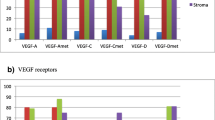Abstract
Previous studies obtained contradicting results regarding the correlation between expression of VEGF-A, VEGF-C and colorectal cancer patients’ clinicopathological features and prognosis. Moreover, the association between the growth factors’ expression and lymphatic vessel invasion (LVI) with intratumoral and peritumoral difference has not been reported. In this study, 81 primary colorectal cancer samples were immunohistochemically stained for VEGF-A, VEGF-C and podoplanin. The expression of VEGF-A and VEGF-C in marginal portion was significantly higher than those in central portion (P = 0.000 for both). The expression of VEGF-A in marginal portion was correlated with lymph node metastasis (P = 0.031). The expression of VEGF-C in marginal portion was correlated with TNM stage (P = 0.045), peritumoral LVI (P = 0.048) and lymph node metastasis (P = 0.019). The group with high VEGF-A expression in marginal portion showed worse survival than the low expression group (P = 0.039). Patients with high expression of VEGF-C in the marginal portion were not significantly different from those with low VEGF-C expression (P = 0.121). Patients with high expression of both VEGF-A and VEGF-C in the marginal portion showed the worst survival (P = 0.015). In conclusion, increased expression of VEGF-A and VEGF-C in marginal portion of colorectal cancer was correlated with lymph node metastasis. VEGF-C facilitates colorectal cancer cells invade into peritumoral lymphatic vessels, and different mechanisms may exist in the invasion of tumor cells into peritumoral and intratumoral lymphatic vessels. Assessment the expression of both VEGF-A and VEGF-C in the marginal portion of tumor may help to identify patients with colorectal cancer with unfavourable overall survival.



Similar content being viewed by others
References
Ferrara N, Gerber HP, LeCouter J. The biology of VEGF and its receptors. Nat Med. 2003;9:669–76.
Shayan R, Achen MG, Stacker SA. Lymphatic vessels in cancer metastasis: bridging the gaps. Carcinogenesis. 2006;27:1729–38.
Carmeliet P, et al. Abnormal blood vessel development and lethality in embryos lacking a single VEGF allele. Nature. 1996;380:435–9.
Roy H, Bhardwaj S, Ylä-Herttuala S. Biology of vascular endothelial growth factors. FEBS Lett. 2006;580:2879–87.
Yamazaki Y, Morita T. Molecular and functional diversity of vascular endothelial growth factors. Mol Divers. 2006;10:515–27.
Dvorak HF. Vascular permeability factor/vascular endothelial growth factor: a critical cytokine in tumor angiogenesis and a potential target for diagnosis and therapy. J Clin Oncol. 2002;20:4368–80.
Nagy NA, et al. Vascular permeability factor/vascular endothelial growth factor induces lymphangiogenesis as well as angiogenesis. J Exp Med. 2002;196:1497–506.
Stacker SA, et al. VEGF-D promotes the metastatic spread of tumor cells via the lymphatics. Nat Med. 2001;7:186–91.
Duff SE, et al. Vascular endothelial growth factors C and D and lymphangiogenesis in gastrointestinal tract malignancy. Br J Cancer. 2003;89:426–30.
Jeltsch M, et al. Hyperplasia of lymphatic vessels in VEGF-C transgenic mice. Science. 1997;276:1423–5.
Enholm B, et al. Adenoviral expression of vascular endothelial growth factor-C induces lymphangiogenesis in the skin. Circ Res. 2001;88:623–9.
Karkkainen MJ, et al. Vascular endothelial growth factor C is required for sprouting of the first lymphatic vessels from embryonic veins. Nat Immunol. 2004;5:74–80.
Pepper MS. Lymphangiogenesis and tumor metastasis: myth or reality? Clin Cancer Res. 2001;7:462–8.
Boone B, et al. The role of VEGF-C staining in predicting regional metastasis in melanoma. Virchows Arch. 2008;453:257–65.
Furudoi A, et al. Clinical significance of vascular endothelial growth factor C expression and angiogenesis at the deepest invasive site of advanced colorectal carcinoma. Oncology. 2002;62:157–66.
Mohammed RAA, et al. Prognostic significance of vascular endothelial cell growth factors -A, -C and -D in breast cancer and their relationship with angio- and lymphangiogenesis. Br J Cancer. 2007;96:1092–100.
Kaio E, et al. Clinical significance of angiogenic factor expression at the deepest invasive site of advanced colorectal carcinoma. Oncology. 2003;64:61–73.
Kojima M, et al. Clinical significance of nuclear morphometry at the invasive front of T1 colorectal cancer and relation to expression of VEGF-A and VEGF-C. Oncology. 2005;68:230–8.
Kondo K, Kaneko T, Baba M, Konno H. VEGF-C and VEGF-A synergistically enhance lymph node metastasis of gastric cancer. Biol Pharm Bull. 2007;30:633–7.
Kurahara H, et al. Impact of vascular endothelial growth factor-C and -D expression in human pancreatic cancer: its relationship to lymph node metastasis. Clin Cancer Res. 2004;10:8413–20.
Nanni O, et al. Role of biological markers in the clinical outcome of colon cancer. Br J Cancer. 2002;87:868–75.
George ML, et al. VEGF-A, VEGF-C and VEGF-D in colorectal cancer progression. Neoplasia. 2001;3:420–7.
Sobin LH, Wittekind CH. International union against Cancer. TNM classification of malignant tumors. 6th ed. New York: Wiley-Liss; 2002.
Jemal A, et al. Cancer statistics. CA Cancer J clin. 2006;56:106–30.
Folkman J. What is the evidence that tumors are angiogenesis dependent? J Natl Cancer Inst. 1990;82:4–6.
Duff S, et al. Vascular endothelial growth factors and receptors in colorectal cancer: implication for anti-angiogenic therapy. Eur J Cancer. 2006;42:112–7.
Mandriota SJ, et al. Vascular endothelial growth factor-C-mediated lymphangiogenesis promotes tumour metastasis. EMBO J. 2001;20:672–82.
Siriwardena B, et al. VEGF-C is associated with lymphatic status and invasion in oral cancer. J Clin Pathol. 2008;61:103–8.
Kinoshita J, et al. Clinical significance of vascular endothelial growth factor-C (VEGF-C) in breast cancer. Breast Cancer Res Treat. 2001;66:159–64.
Adachi Y, et al. Lymphatic vessel density in pulmonary adenocarcinoma immunohistochemically evaluated with anti-podoplanin or anti-D2-40 antibody is correlated with lymphatic invasion or lymph node metastases. Pathol Int. 2007;57:171–7.
Kabashima A, Maehara Y, Kakeji Y, Sugimachi K. Overexpression of vascular endothelial growth factor C is related to lymphogenous metastasis in early gastric carcinoma. Oncology. 2001;60:146–50.
Fukunage S, et al. Association between expression of vascular endothelial growth factor C, chemokine, receptor CXCR4 and lymph node metastasis in colorectal cancer. Oncology. 2006;71:204–11.
Zhang B, et al. Expression of vascular endothelial growth factors-C and D correlate with evidence of lymphangiogenesis and angiogenesis in pancreatic adenocarcinoma. Cancer Detect Prev. 2007;31:436–42.
Author information
Authors and Affiliations
Corresponding author
Rights and permissions
About this article
Cite this article
Lin, M., Lin, Hz., Ma, Sp. et al. Vascular endothelial growth factor-A and -C: expression and correlations with lymphatic metastasis and prognosis in colorectal cancer. Med Oncol 28, 151–158 (2011). https://doi.org/10.1007/s12032-010-9427-1
Received:
Accepted:
Published:
Issue Date:
DOI: https://doi.org/10.1007/s12032-010-9427-1




